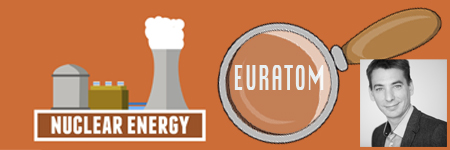An opinion column of Bender Javor, Member of the European Parliament and member of NTW
Last week the European Commission made a decision on one of its investigations related to the new Nuclear Power Plant, Paks II of Hungary. An infringement procedure was opened because of the lack of compliance with EU public procurement rules after the Hungarian Government directly awarded the nuclear project to Rosatom. In its decision the European Commission approved the reasoning of the Hungarian Government and allowed the project to proceed without competition and without transparent public procurement based on technical exclusivity, stating that only the Russian reactor fits the Hungarian legal requirements. The details of the Commission’s justifications are not published yet, however, without going into details we can draw a clear conclusion: the Paks II agreement is again one of the ad hoc, shady deals of the Commission which follows along the history of the nuclear sector from the very birth of EURATOM.
The idea at the founding of the EU was the creation of a common European market and granting equal access by Member States to scarce resources. The aim was “to make war not only unthinkable but materially impossible” (Schuman Declaration).
Although, the idea of the declaration is still valid, since the early 1950s the world is slowly moving from coal, oil and nuclear to renewable energy sources. Tackling climate change and the need to shift our economy towards sustainability have become core issues of cooperation in Europe and beyond, as for example the Paris Agreement shows. To meet these challenges, the EU amongst others created an ambitious plan of establishing a European Energy Union, further strengthening the EU’s single energy market to ensure that Europe has secure, affordable and climate-friendly energy and to further the original aim of a peaceful Europe.
While European policymaking must react to the challenges of the 21st century, it still has to fit to an outdated legal framework which dates back to the nineteen fifties and which doesn’t treat the different sources of energy equally. This is just absurd. It is as if the information and telecommunication technology market was regulated by unchanged rules since the 1950s. It seems unimaginable. And that’s exactly the case with nuclear energy.
As a primary law, EURATOM and the Treaty of the Functioning of the EU provide different rules and conditions for nuclear energy compared to other sources of energy. In theory, according to Article 194 of the TFEU, renewable energy sources should be prioritised, but in practice nuclear is in a more favourable position because EURATOM seems to be exempted from the market rules. Although Member States are free to choose their energy mix, when it comes to investment in the field of nuclear, any form of support is considered as “facilitation of investment and supporting the EURATOM objectives” (according to Art 2c of the EURATOM) and as such, state aid is lately almost automatically accepted. The European Commission madeits position clear in its decision on Hinkley Point “C”. The news about the possible outcome of the pending Hungarian Paks II state aid case also strengthens such an understanding.
When it comes to new capacity in Europe the Member States should be offering tendering procedures under Article 8 of the Electricity directive: based on technology neutrality so they could choose objectively, under market conditions, to assess which source of energy is cheapest and the most competitive for the future. Unfortunately, the Commission does not consider it applicable to nuclear energy.
In the Brittany case, France chose gas turbines to fulfil the need for new capacity. The Commission opened a case against France under Article 8 as they believed that alternative sources were not considered. But the same rules does not apply to Paks II due to EURATOM.
As I mentioned already public procurement directives are not equally applicable for nuclear and renewables and rules can be easily circumvented. In fact, the Commission is willing to accept that Member States can refer to their own technical specification when discriminating against other suppliers in the nuclear market. In any other sector of the internal market, it would be unacceptable for the Commission and of course for the European Court of Justice.
Under such circumstances, it seems that we have a biased legal environment. It allows discrimination against certain sources of energy, renewables in particular, and there are no equal opportunities on the energy market.
Since the adoption of the Rome Treaty, the treaties have been regularly updated to meet the challenges of the day. EURATOM is unchanged since 1957. The situation could be somewhat improved if there was a coherent and up to date secondary legislation in the field of nuclear on the internal market. But there isn’t. In fact the situation is comparable to a city court basing its legal arguments on a day to day direct interpretation of the Constitution Indeed, here the interpretation depends on the Commission.
The EU definitely needs a predictable strong common energy market, where investors and all Member States can feel certain about their investments and their long-term profit perspectives. But conferring special status on nuclear with exemptions from the European competition and public procurement laws cannot represent common European objectives and a free energy market cannot be built on this foundation in the future.
If the Commission really want a competitive and united energy market, they should interpret and apply the existing rules according to the needs and the conditions of the 21st century and not according to the outdated and short-sighted needs of some Member States or on the ancient traditional views of technocrats. I have no doubt that the European Court of Justice would support a position which takes into consideration the technological and political developments if the final word was theirs.
